The History of Urban Edge

![]()
1974-1978
The Ecumencial Social Action Committee forms a corporation, Urban Edge, to expand its homeownership counseling and rehabilitation work. Ronald Hafer is appointed Executive Director. A realty brokerage service is added in order to renovate and market previously abandoned 1-6 family properties to first-time homebuyers. This attracts new home mortgages to Jamaica Plain and surrounding neighborhoods.
![]()
Early Staff Meeting [1974-1978]
In the mid-1970s Urban Edge’s office was on Centre Street in Jamaica Plain, where this early staff meeting took place. Here, founder and executive director Ron Hafer directs a staff that is focusing on “urban homesteading” – putting abandoned and condemned homes back into use by acquiring and renovating them, then acting as a non-profit real estate broker. The end result was to sell these renovated homes to modest-income first-time homebuyers, some of whom contributed “sweat equity” to make the deal more affordable.
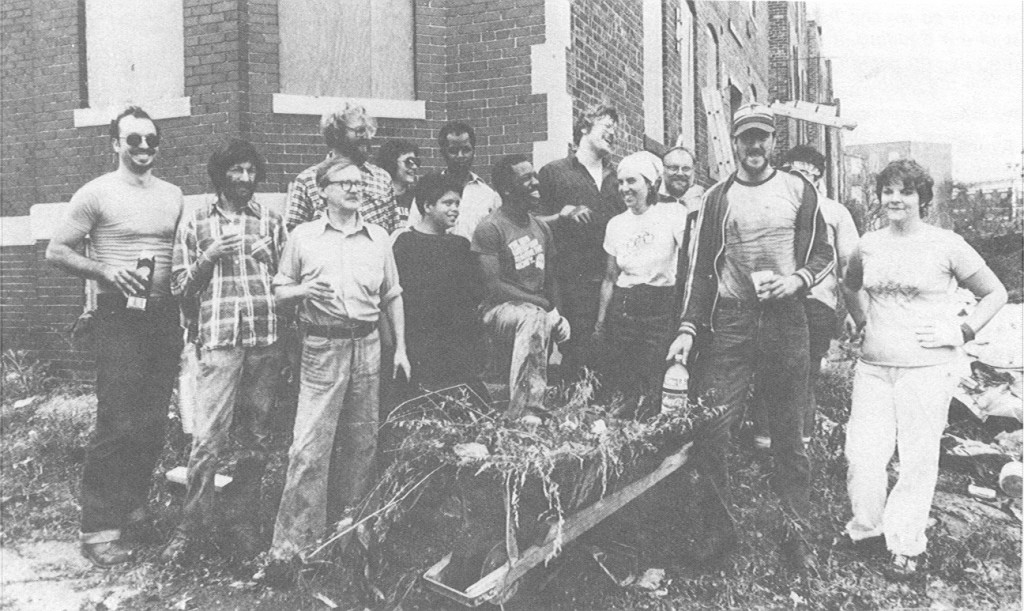
Community Workday [1977]
Despite its prominent location, historic architecture and value as housing, in the 1970s HUD abandoned the 54-unit Dimock-Bragdon Apartments, located on Columbus Avenue in Roxbury. Urban Edge organized a community cleanup of the weedy, trash-strewn backyards of the development as the first step in reclaiming this community asset. Here, in 1977, residents take charge of the abandoned Dimock-Bragdon Apartments. By 1980 Urban Edge began a gut renovation of the complex under Urban Edge ownership, preserving another valuable housing resource for generations to come. (L-R) Dan Satinsky, Howard Brand, Frank Smizak (rear), Jack Plunkett, Carol Leary, unidentified (2), Leon Mobley, Tom O’Malley, Mary Wheeler, Ron Hafer, Carl Stewart, unidentified (rear), Barbara Burnham.
![]()
1979-1983
Boston’s housing boom hits Jamaica Plain, and housing prices skyrocket. Urban Edge’s focus shifts to the long-term preservation of multi-unit affordable rental housing; 200 units in Jamaica Plain, Roxbury and Dorchester are purchased. Urban Edge establishes a property management affiliate to manage its rental housing. A gut rehab of a 54-unit development in Roxbury signals a new era of larger and more diverse projects.
![]()
Dixwell Street scene [1979-1983]
In 1980, the Dixwell Street block between Columbus Avenue and School Street was one of the worst of the deteriorated blocks of multi-family rental housing in Egleston Square. Vacant and dilapidated buildings were evident. Families lived there in substandard conditions, uncertain about their future and the fate of their housing. As part of its focus on Egleston Square, Urban Edge acquired and renovated the entire block and has preserved it as permanent affordable housing.
![]()
1984-1988
Urban Edge renovates 82 units through the Boston Housing Partnership (BHP) and purchases Cleaves Court and the Montebello Co-op. The Manufactured Housing Program results in 16 condos, the area’s first affordable housing construction in decades. BHP selects Urban Edge to renovate 65 units of HUD-foreclosed “Granite Properties”. Mossik Hacobian is appointed Executive Director. An Ownership Services Department is created to improve service delivery and to help interested residents assume greater control of their housing.
![]()
They hammered in the morning [1984-1988]
A typical scene during the late 1970s “urban homesteading” program, with paid workers and prospective homebuyers joining forces in renovating abandoned homes for resale to first-time buyers.
![]()
Gov. Dukakis and Lt. Gov. Kerry pay a visit [1987]
1987 was the busiest year of Urban Edge’s Homeownership Program, with 65 units renovated for new owners. The governor and lt. governor came to Jamaica Plain to see a large 2-family house at 434 Centre Street that Urban Edge had renovated as part of the Boston Homesteading Program. Pictured with Dukakis and Kerry are the new owners, the Dussourd family, and at top, Frank Tate, Director of the Boston Homesteading Program and Luis Mirambeaux of the Urban Edge staff.
![]()
Mayor Ray Flynn plants hope [1989-1993]
Boston Mayor Raymond L. Flynn visited Egleston Square in the 1980s as part of the “Hands Around Egleston.” Founded by Delphine Walker, this annual event is a celebration of neighborhood peace and unity. Here the mayor helps children plant seedlings as part of a beautification project.

Egleston Center at night [1989-1993]
The 7,000 square foot Egleston Center was developed by Urban Edge in 1991 on the site of Egleston Station of the old elevated Orange Line, demolished in 1987. The I-beam across the building’s center span is a visual reminder of the track’s former presence. Egleston Center was the first new commercial construction in Egleston in many decades and houses the neighborhood’s first and only bank and 3 other retail outlets.
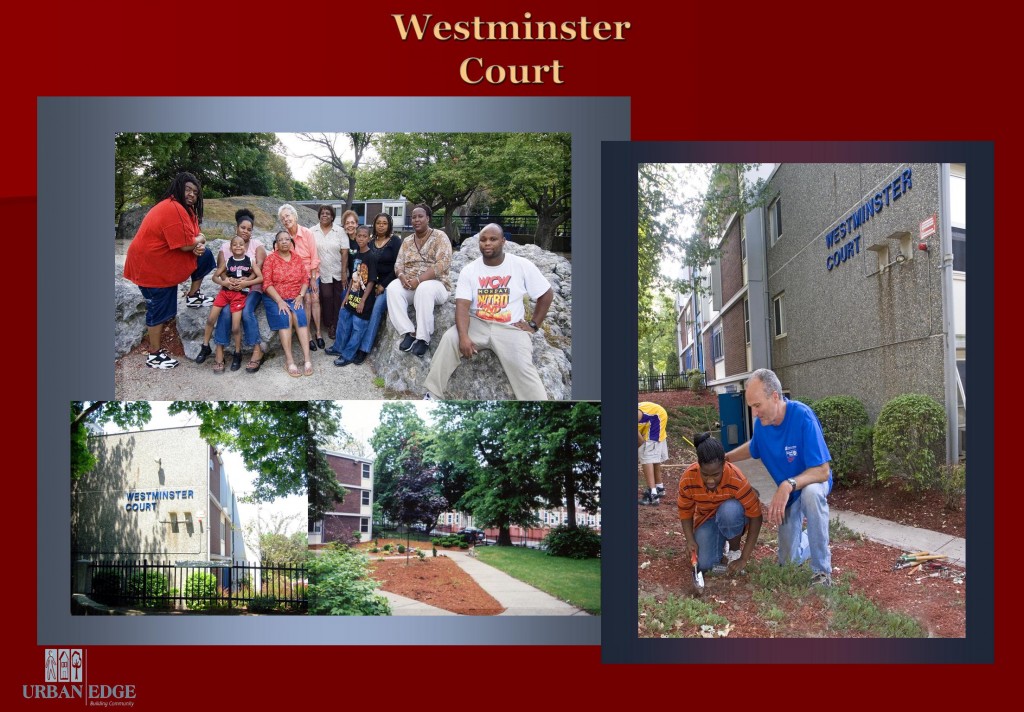
Westminster Court, co-owned by its Tenants’ Association [1994-1998]
Roxbury’s 70-unit Westminster Court, built in 1969, was purchased from its investor owners by its tenants’ association and Urban Edge, and was renovated in 1996. It was the first of 3 Urban Edge developments to employ a 50-50 ownership partnership, in which the organized tenants have a permanent decision-making role in all aspects of the development’s operation and asset management. Tenants of Westminster have become important and long-serving members of Urban Edge’s Board.
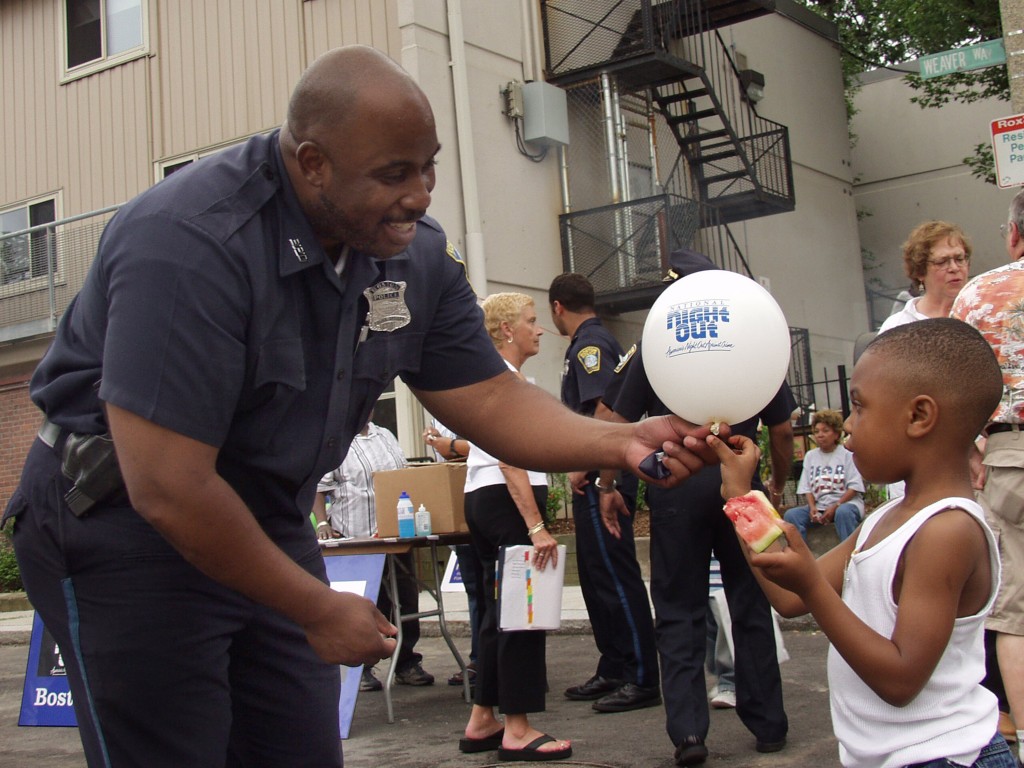
Officer Billy Baxter and friend at Academy I for National Night Out [1998-2002]
Every year in August the Boston Police Department and other police departments nationwide join with community residents in National Night Out, when residents and the police who serve them share food, music and other activities. There is an award ceremony for residents and officers who exemplify the best in community policing partnerships. Officer Baxter of Area B-2 served as a youth service officer, and with other officers, mentored children and teens, often taking them on recreational outings to establish stronger ties with the community’s youth.
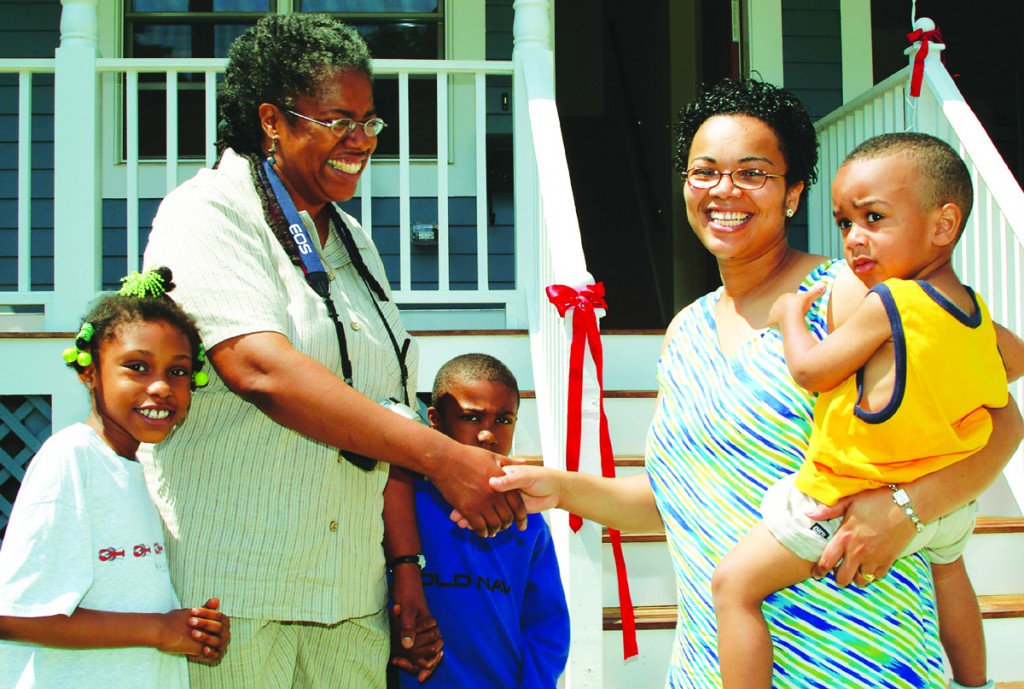
New homeowners on Westminster Avenue grow neighbors [1998-2002]
In 2002 Urban Edge completed construction of two 2-family homes at 21-27 Westminster Avenue in Roxbury. Four first-time homebuyer families moved in, including one family who purchased under the Section 8-to-Homeownership Program.
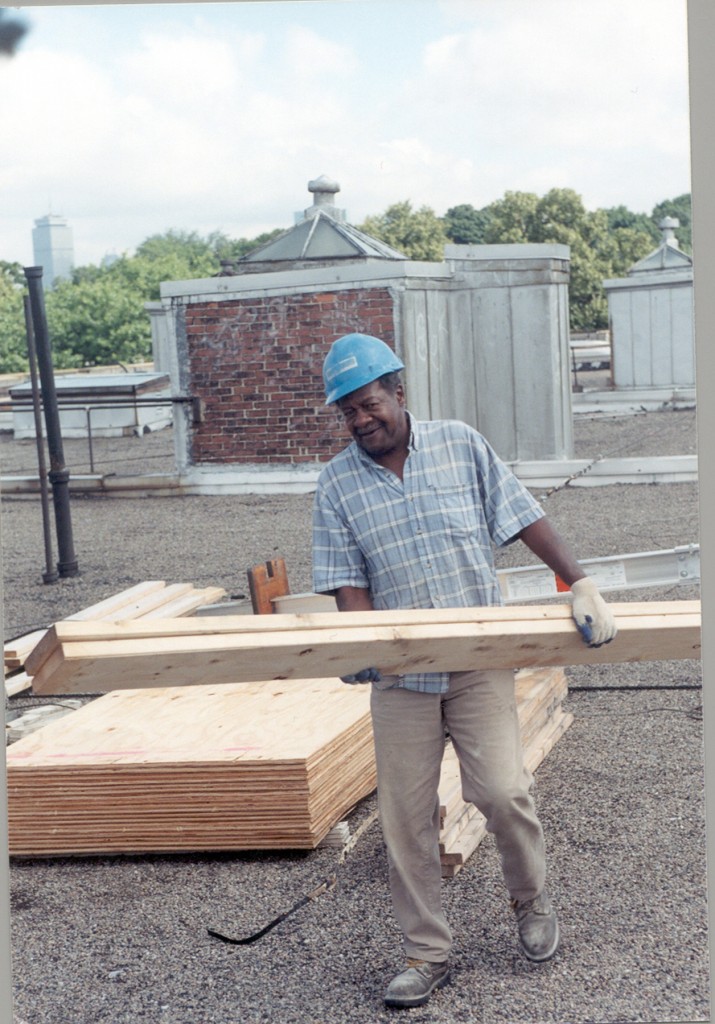
Working close to home—renovating Wardman Apartments [1998-2002]
In 2000 Urban Edge acquired and renovated the 88-unit Wardman Apartments in Roxbury. For every Urban Edge project, our real estate department sets workforce participation goals that meet or exceed Boston’s goals for participation in the workforce of minorities, women and Boston residents.

Academy I residents celebrate at the Wake Up the Earth Festival [1998-2002]
Residents of Academy Homes I march in the 1999 “Wake Up the Earth” Festival parade, held on the first Saturday in May to mark the spring renewal of the earth and its inhabitants. Pre-Festival workshops took place in Academy Homes’ Community Room and many other sites and got adults and children involved in banner-making and other festival arts. Parade-watchers join with the residents of Academy Homes I in celebrating a new day at their formerly troubled housing development in Jackson Square.
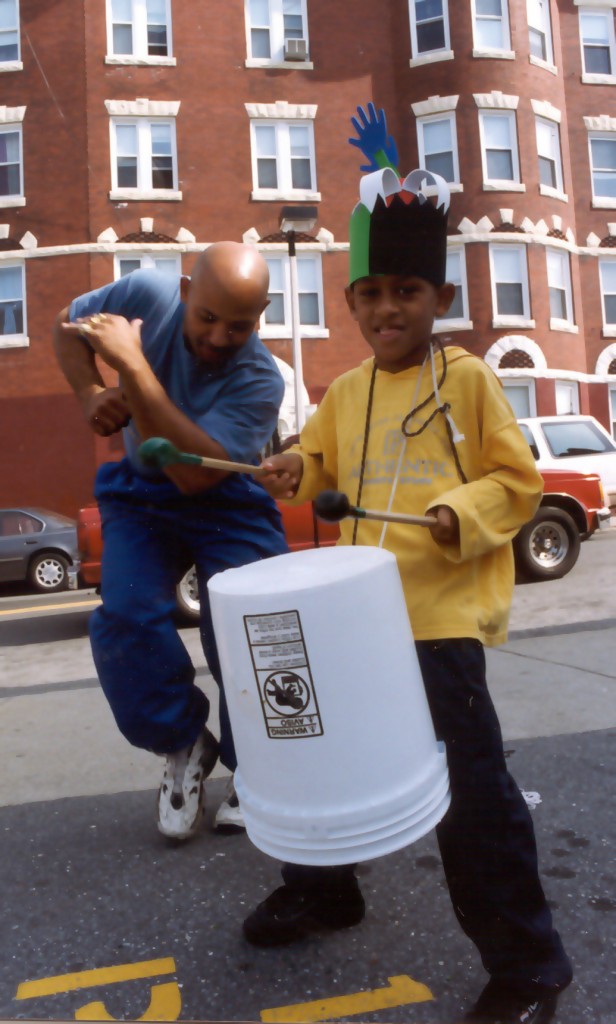
The street beat—“Hands Around Egleston Square” [1998-2002]
“Hands Around Egleston Square”, the annual celebration of neighborhood peace and community unity, always showcased children and teens engaged in positive activities to counter the negative influences of gang and drug activity. These youngsters are making music with everyday objects and dancing to a street beat, doing their part to bring peace and harmony to formerly troubled streets.

The leaders meet–Betty Green and Mayor Menino at the Academy Homes I ribbon-cutting [1998-2002]
The 202-unit Academy Homes I in Roxbury was acquired by its Tenants Association and Urban Edge and renovated in 1999. Tenant’s Association Chairperson Betty Greene, who died in 2006, shares the renovation ribbon-cutting honors with Boston Mayor Tom Menino, who throughout his 20-year tenure was devoted to neighborhood revitalization, resident involvement and affordable housing.
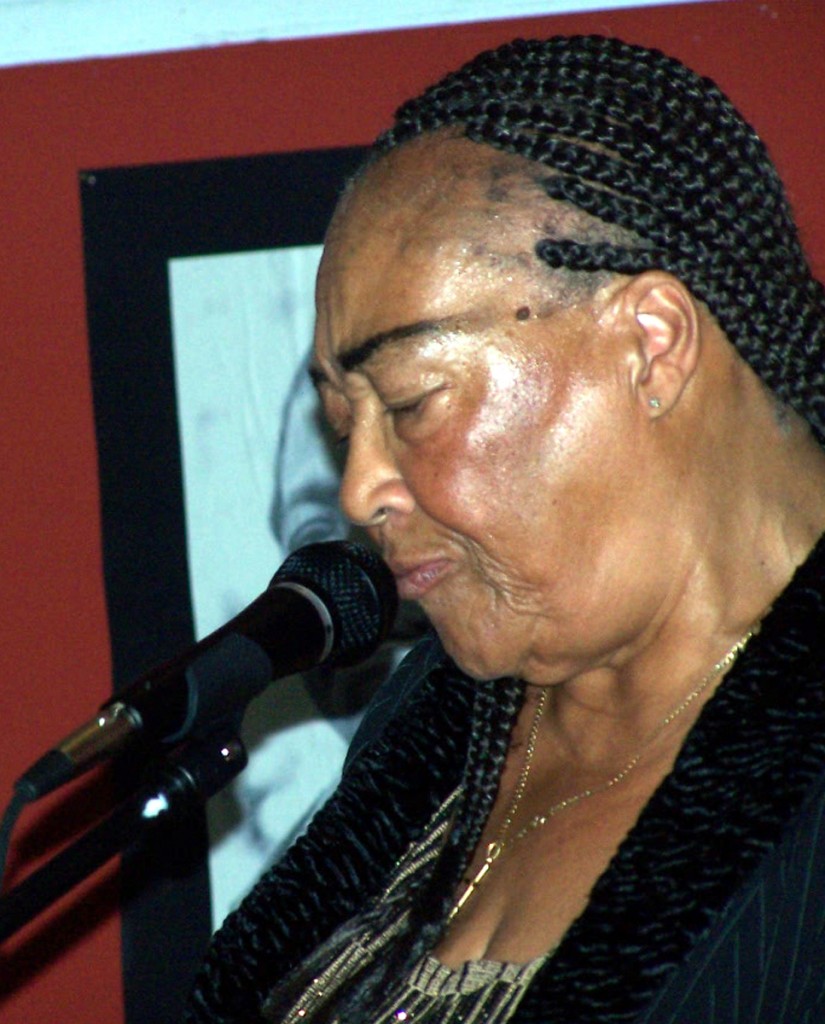
Delphine Walker—fearless defender of the neighborhood and its children, founder of “Hands Around Egleston Square” [1998-2002]
Ms. Walker, who died in 2013, was the matriarch of a large family she raised in an old home at the corner of Walnut Avenue and Walnut Park in Roxbury. A parishioner of the diverse and activist Catholic parish, St. Mary of the Angels, also on Walnut Avenue, Ms. Walker joined forces with the late Father Jack Roussin to lead “Take Back the Streets” processions through the streets of Egleston, then with Father Jack began the annual “Hands” celebration of peace and unity, which was a fundraiser for youth programs.
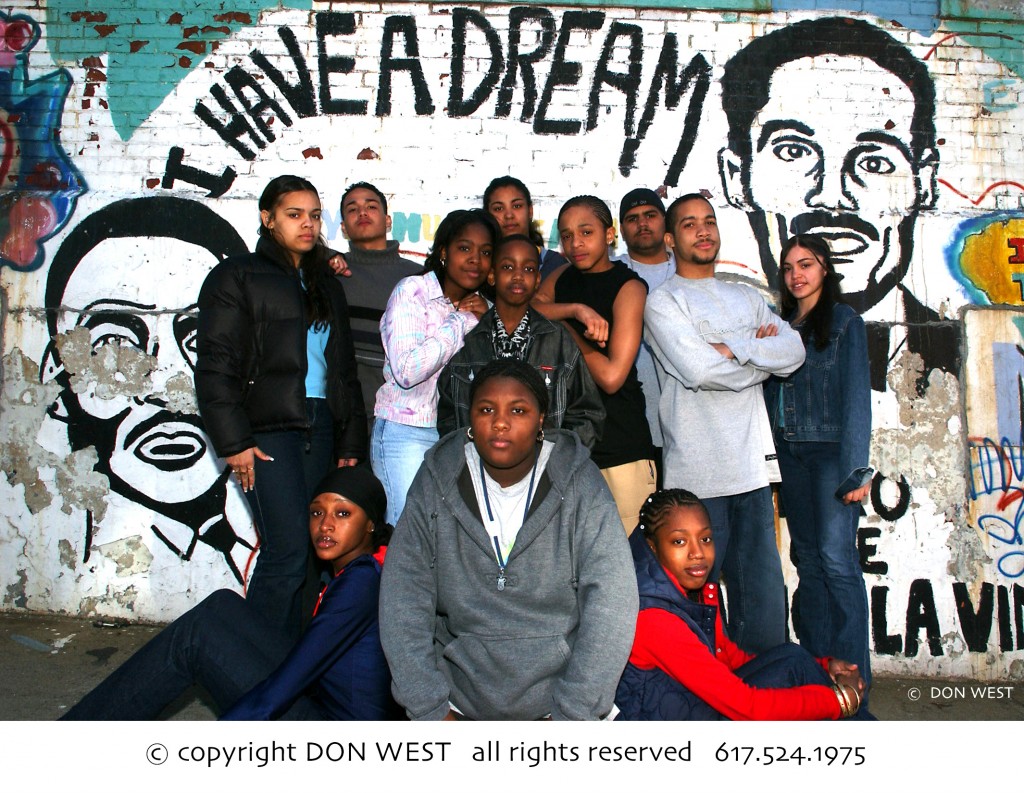
The next generation in front of the X-Men mural on the Roussin Center [1998-2002]
Students from the Egleston Community High School, a pilot alternative school of the Boston Public Schools founded in 1992, pose in front of a mural on the School Street side of the Roussin Community Center – developed by Urban Edge to house the high school and the Egleston YMCA Youth Center. The mural was painted as a gang diversion project in the 1980s by members of the X-Men street gang under the direction of muralist Roberto Chao. In 2003, the mural was repainted under Mr. Chao’s supervision, adding contemporary images that reflect the shift from gang control to community revival.
![]()
1998-2002
The rehab of Academy I is completed, the 88-unit Wardman Apartments and 37 units at Harvard Hill are acquired and rehabbed, and 13 new homes for first-time homebuyers in Roxbury and Roslindale are constructed. Homebuyer classes graduate 750, and 140 become homeowners. Urban Edge and South Shore NHS establish a Section 8 to Homeownership program, and its first Boston client moves into an Urban Edge home. A $2.1 million capital campaign funds renovation and expansion of the Father Jack Roussin Community Center, which houses the Egleston Square Y, the Egleston High School and Our Place Theatre Project. Urban Edge partners with Pine Street Inn to acquire two blighted properties and develop Egleston Crossing with 64 affordable rental apartments, including 15 units designated for formerly homeless households, and 8,300 square feet of retail space.
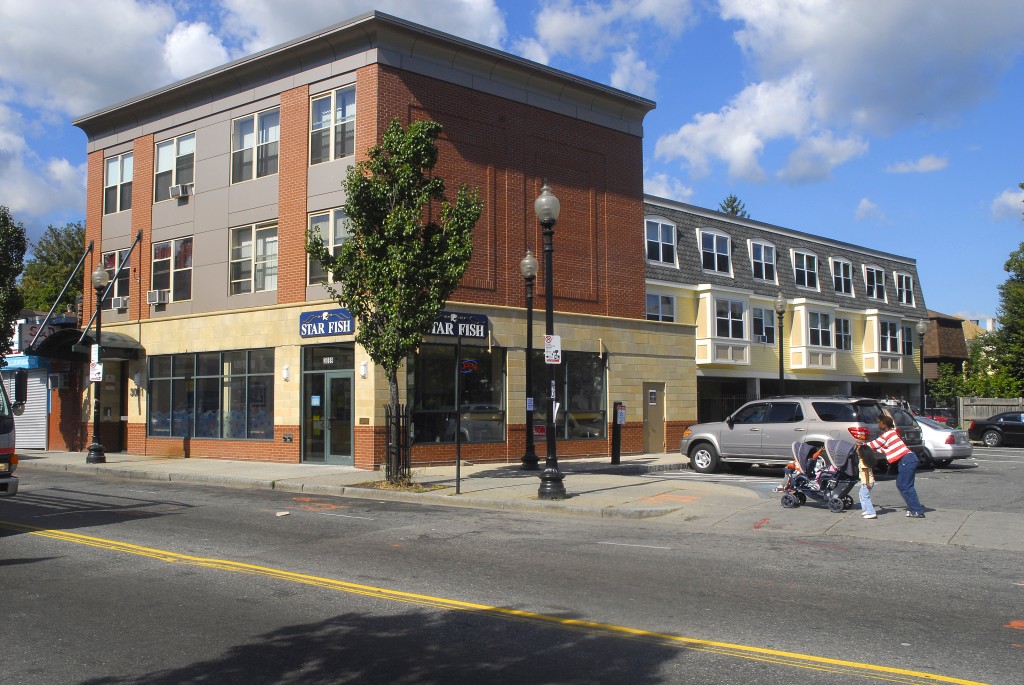
The old Beethoven Theatre becomes Egleston Crossing [2003-2008]
The Beethoven Theatre off Washington Street in Egleston Square stood vacant for decades and was literally falling down when Urban Edge acquired and demolished it. By 2005 construction was completed on Site 1 of Egleston Crossing. These affordable apartments include units set aside for formerly homeless families. Other elements of the development include retail shops at street level and attached townhouses on Beethoven Street.
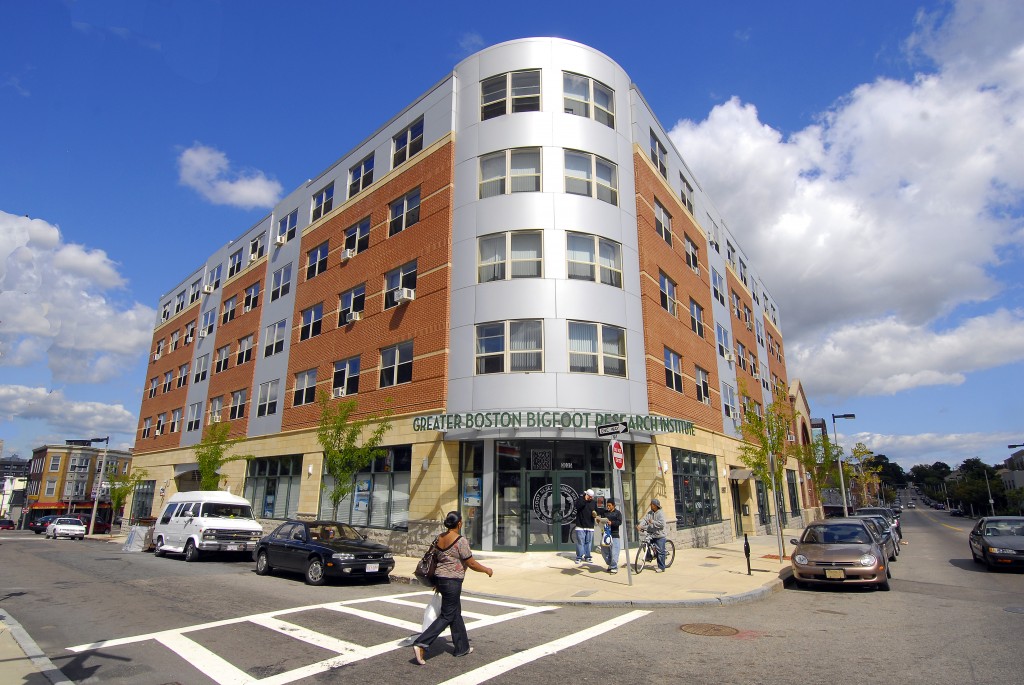
A “problem property” body shop was razed for this new housing and retail [2003-2008]
Site 2 of Egleston Crossing was a block-long concrete building that housed several auto body shops cited by neighbors and the City of Boston for the mishandling of chemicals and involvement in the drug trade. Urban Edge acquired and demolished the building and in 2005 completed construction of affordable apartments with retail at street level including a coffee shop, a dental office, and 826 Boston, a nationally acclaimed writing program for children and teachers. Together the two Egleston Center buildings total 64 apartments and 8,000 square feet of retail space.
![]()
2003-2008
Construction is completed on Egleston Crossing, a “green” development project with renewable energy features, and on Amory Residences, another 64-unit development. Partners for Jackson, led by Urban Edge, Jamaica Plain NDC and the Hyde Square Task Force, is selected to develop hundreds of new housing units, neighborhood-scale retail space and major community facilities on 6.5 acres of public land in Jackson Square. Over 300 residents attend focus groups to finalize plans for Jackson Square. The Jackson Square master plan receives a LEED-ND Silver certification from the U.S. Green Building Council, the first in the northeast U.S.
The former MBTA power station in Egleston square is renovated as the new home for BNN-TV and wins historic preservation awards and LEED Silver certification. Construction is also completed on the 13 Hyde-Blakemore homeownership units in Roslindale with the first homeowners moving in by late 2008.
Urban Edge establishes a Community Programs Department to expand its First-Time Homebuyer Education program, pre- and post-purchase counseling, Financial Fitness, credit counseling, and home rehab and deleading lending. Its foreclosure prevention program reaches the milestone of helping 100 homeowners avert foreclosure.
![]()
2009-2014
Renovations of the 82-unit UELP Apartments and the 103-unit JP Apartments are completed. Construction is completed on a new 12-unit building at Wardman Apartments, to replace a building destroyed by fire.
Urban Edge opens a Youth Leadership Academy, providing young people from area multifamily housing summer and after-school career exploration and mentoring at community agencies and downtown firms. Leadership development and community service are also provided.
Lena Park CDC and Urban Edge enter into a management services contract to provide administrative and management oversight of Lena Park’s resident services and development initiatives. This includes the rehabilitation of LBB Housing and 150 American Legion Highway. Under a development partnership with Allston-Brighton CDC, Urban Edge renovates and refinances Brighton-Allston Apartments.
A three-year executive leadership transition concludes with CEO Chrystal Kornegay assuming the combined position of President and CEO from outgoing President Mossik Hacobian on January 1, 2011.
With support from the Ford Foundation Urban Edge pilots an Income Enhancement Program to screen tenant households for public benefits eligibility, then expands the pilot into an Economic Resiliency Initiative that helps families build assets with financial coaching. The program is scaled up to include additional multi-family developments and owners.
Urban Edge opens a Volunteer Income Tax Assistance Center, providing free tax preparation and filing to area residents. Foreclosure prevention counseling capacity grows with the addition of part-time counselors. Services are extended to every Boston neighborhood and 60 other cities and towns in the region.
Urban Edge launches a Student Loan Borrower Repayment Counseling Program in collaboration with the University of Missouri/St. Louis. With JumpStart and Associated Early Care and Education, Urban Edge creates a pilot Pre-K Preparation program for children and parents.
Urban Edge is accepted into NeighborWorks’ Sustainable Homeownership Project, and the Mass. Department of Housing and Community Development selects Urban Edge for an award of Community Investment Tax Credits.
The first major Jackson Square project, 225 Centre Street, is constructed by Mitchell Properties and The Community Builders. Urban Edge breaks ground on Jackson Commons, 37 new units of rental housing and begins the rehab of the Webb Building for offices, program and retail space.
The Commonwealth commits $5.69 million in state bond funding for the construction of the Jackson Square Recreation Center by Urban Edge, which then begins a $6.5 million capital campaign for the project.
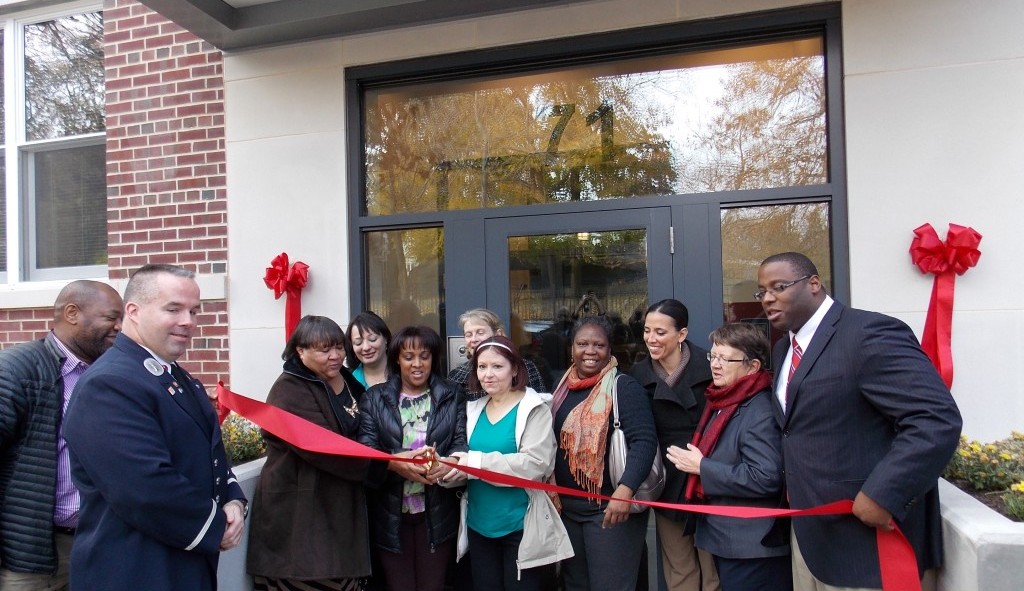
Keeping our promises—12 families displaced by fire are back home at Wardman Apartments [2009-2014]
Just 2 years after a devastating multi-alarm fire destroyed a building and displaced 12 families at Wardman Apartments, Urban Edge completed construction of a new 12-unit building at 71 Westminster Avenue. At the ribbon-cutting in 2013 members of the Boston Fire Department and resident leaders are joined by Urban Edge President and CEO Chrystal Kornegay (4th from right) and City and State officials.
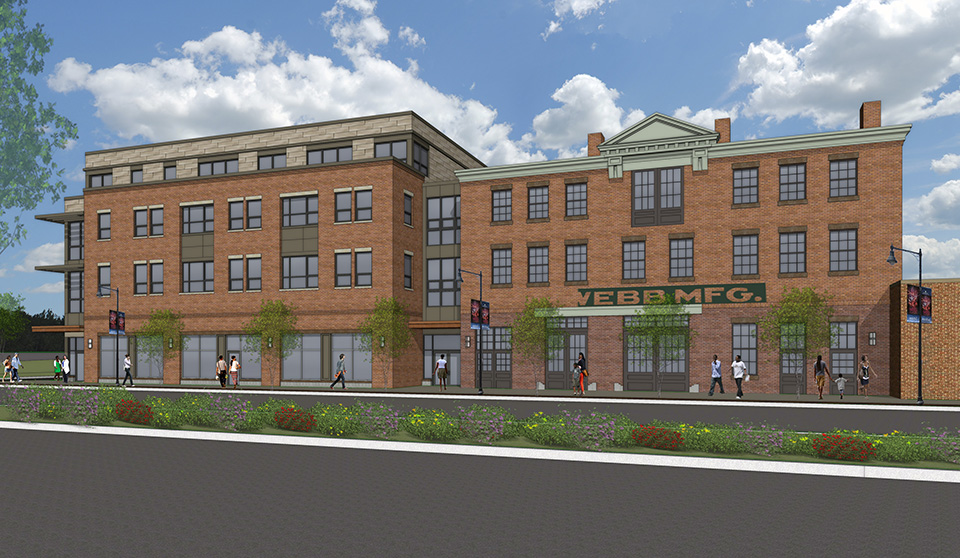
2014 to 2018
Urban Edge developed projects ahead with the additions of Jackson Commons, Walker Park Apartments. Jackson Commons is a green (LEED NC Silver), mixed-use, mixed-income, transit-oriented component of Jackson Square Partners LLC’s 14-building, $250 million redevelopment effort in the Jackson Square community of Boston’s Roxbury and Jamaica Plain neighborhoods.
Jackson Commons will include 37 rental apartments, including historic rehabilitation of the Webb Building and new construction on the north side of the building. 8 units will be dedicated for homeless households, who will benefit from an on-site resource coordinator who will provide case management services to all of the residents living in the building. Approximately 12,000 square feet on the ground floor will function as a neighborhood learning center and retail/office space.
Walker Park Apartments is a proposed 2 site, 3 building, new construction, affordable housing development located in the Egleston Square section of Boston's Roxbury neighborhood. The project will provide much needed affordable housing to approximately 40-45 households.
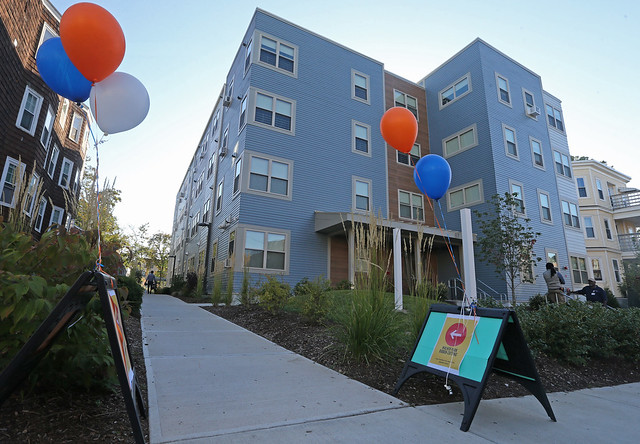
2019 and Beyond: What’s Ahead for Urban Edge
Walker Park was named after the late Delphine Walker, a longtime neighborhood activist. The new property at 80 Walnut Park was built on the site where Ms. Walker raised her family. A pocket park was also built on the part of 67 Walnut Park that faces Columbus Ave. The park is next to the Egleston branch of the Boston Public Library. It's named Delphine's Courtyard and was financed with Community Preservation Act funds from the City of Boston.
"My mother cared a lot about Egleston and I know she's looking down on Walker Park and is very proud and happy," said her daughter Pamela Walker, representing the many children and relatives of Delphine Walker who attended the event.
In the summer of 2019 Urban Edge selected our new Chief Executive Officer, Emilio Dorcely. Born in Haiti and raised in New York City, Emilio has held a variety of positions in community development and philanthropic organizations. Prior to Bridge Street, Emilio worked with the Association of Black Foundation Executives, in the Executive Office of the Mayor of Washington, DC, and for the Rhode Island Foundation, among other positions. He is an alumnus of the State University of New York at Oswego and holds a JD from the University of Iowa College of Law.
A quick note from Emilio to our community: “Urban Edge has a rich history, which started as a grassroots response to policy and structural changes in the community. I am looking forward to building on that history and to finding ways to promote systemic change while also developing innovative ways to meet the needs of people living in Roxbury, Jamaica Plain, and beyond.”
















